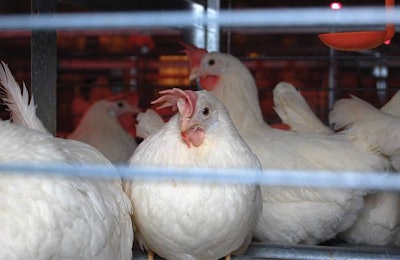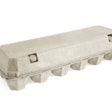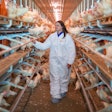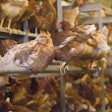
The grocery arm of the body for Canadian retailers has rolled out a 10-year plan to source the eggs its members sell from laying hens raised in “cage-free environments.” Grocer members of the Retail Council of Canada (RCC) include Loblaw, Sobeys/Safeway, Metro and Wal-Mart Canada.
David Wilkes, senior vice-president for government relations and the grocery division at RCC, said in a release that the grocers’ commitment is “made recognizing the restrictions created by Canada’s supply management system.” The cage-free timeline, he said, “will have to be managed in the context of availability of supply within the domestic market.”
The RCC’s pledge comes just a few weeks after the Egg Farmers of Canada announced a plan to move out of conventional cages to enriched cages for housing laying hens by 2036. Coupled with purchase pledges by major Canadian restaurant chains such as Tim Horton’s and McDonald’s, the RCC purchase pledge seems to make the Egg Farmers of Canada enriched cage housing plan obsolete.
How will Canadian hens be housed?
The National Farm Animal Care Council expects to release a new Canadian code of practice for layer hens later this year. When released, National Farm Animal Care Council’s layer hen code is expected to guide Canada’s egg sector on various aspects of farm management and welfare practices, by way of “recommendations and requirements for housing, care, transportation, processing and other animal husbandry practices,” the RCC said.
Wilkes said that the RCC, “remains firmly committed to the National Farm Animal Care Council process and will work with other participants to not only advance our voluntary commitment to move to cage-free environments by the end of 2025, but also by ensuring suppliers adhere to the code’s recommendations.”
Following the RCC announcement, the Egg Farmers of Canada said in a statement that it is "committed to research on these systems and on consumer preferences, and to ensuring evidence-based decision-making when it comes to industry practices. This ensures choice and price stability to shoppers while protecting the entire supply chain from shortages or the production of eggs for which there are no market.”
The statement continued, “Recently, Egg Farmers of Canada announced a systematic, market-oriented transition from conventional egg production toward other methods of producing eggs. We look forward to working with retailers to ensure high-quality Canadian eggs remain on grocery shelves everywhere and we will continue to work with our supply chain to do so and to align our approaches as much as possible.”
Enriched cages or cage free
Egg Farmers of Canada has not given up entirely on enriched cages for housing hens: “Our industry transition plan considers the growing body of scientific evidence pointing to the benefits of enriched housing, which allows hens to exhibit specific behaviors which may include perching, scratching, foraging, dust bathing and nesting. The industry looks forward to discussing these important aspects, and the broader transition plan, with its supply chain and stakeholders as this process unfolds.”
Canadian egg farmers pledge to continue to work with the National Farm Animal Care Council. “We are long-time supporters and participants of the National Farm Animal Care Council and have brought this industry plan forward to their current multi-stakeholder review of the Code of Practices for the egg industry,” Egg Farmers of Canada said in a written statement. “We are committed to helping all stakeholders understand our transition. We believe a Code that takes into account what the egg industry analyzed, developed and proposed to be realistic will be stronger, and a tremendous framework on which to make many other enhancements to our industry for years to come.”


















